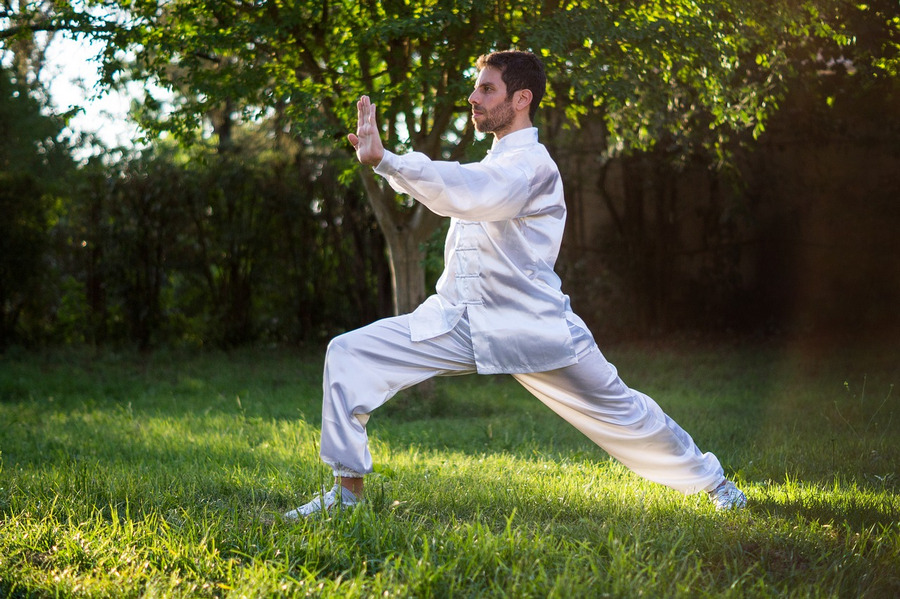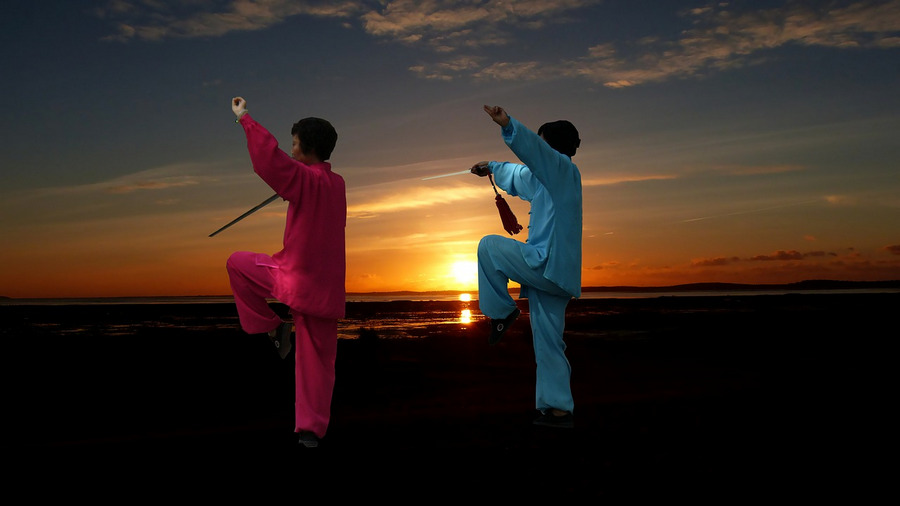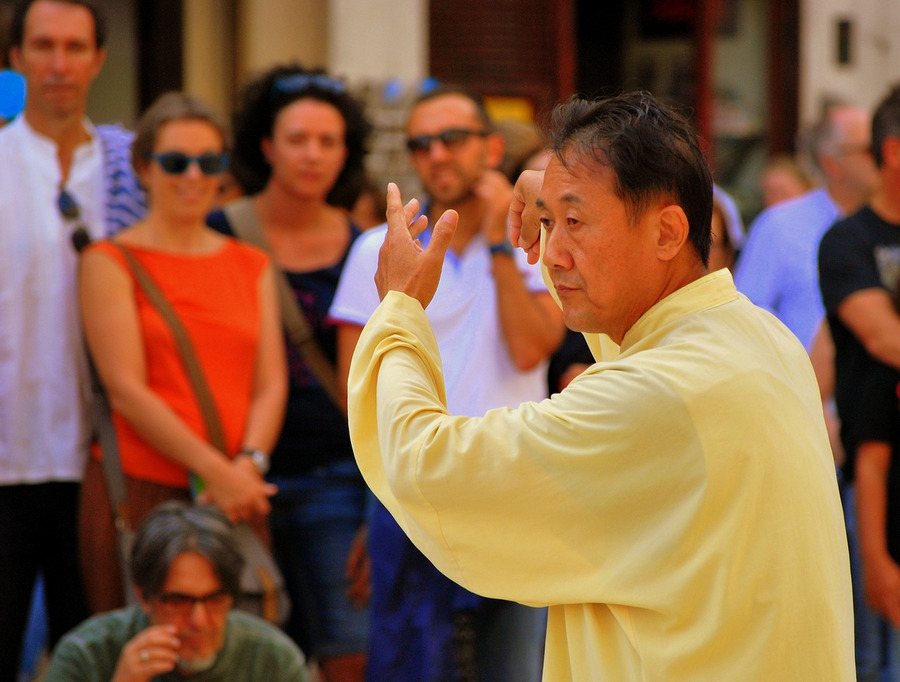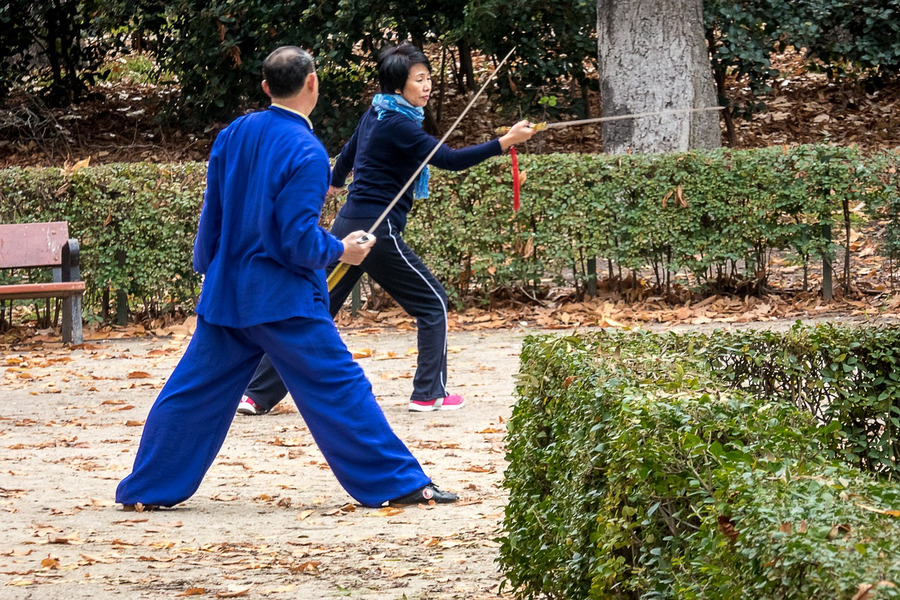Tai chi for seniors with dementia provides both mental and physical benefits to those experiencing cognitive decline.
According to a 2014 review from the Journal of the American Geriatrics Society: Tai Chi shows potential to enhance cognitive function in older adults, particularly in the realm of executive functioning and in individuals without significant impairment. Larger and methodologically sound trials with longer follow-up periods are needed before more-definitive conclusions can be drawn.
This article will explore some common benefits for seniors.

What is Tai Chi
Millions around the world have practiced tai chi since its inception over 2000 years ago. The name translates to “Supreme Ultimate Fist” because it combines hard and soft movements which allow practitioners to develop internal energy (chi) while also practicing defensive techniques. It focuses on maintaining balance and flexibility while moving in slow, deliberate motions.
Tai chi is an ancient martial art originating in China for its assistance in health, self-defense, and meditation. It’s one of the most beneficial exercises for seniors.
This ancient martial art reduces the risk of falls, increases functional independence, improves moods, and decreases agitation levels in seniors with dementia. These benefits can be seen in as little as four weeks after starting a regular practice!

15 Benefits of Tai Chi for Seniors with Dementia
Here is an extended list of benefits of tai chi for seniors with dementia
- Exercises are Performed at a Slow Pace – Tai chi practitioners move slowly and perform slow Tai Chi movements. Tai chi movements are smooth and gentle when performed by a tai chi master. Tai chi exercises require less strain on the joints of seniors with dementia due to performing tai chi at a slow pace.
Regular practice of tai chi in seniors is highly beneficial and accessible to many people because of its gentle movements.
- Tai Chi is Easy to Learn – Tai chi movements are not difficult for seniors with dementia to learn quickly. The tai chi forms can be learned easily within three months or less if they have received professional lessons from a tai chi trainer in person or via video. Toward the end of their tai chi training period, performing these moves will become more fluent as they get used to executing maneuvers smoothly and naturally.
- Helps Seniors to Keep Moving – Keeping your body moving becomes more and more important as we age. With various problems common with aging, such as arthritis, back problems, balance issues, and even more serious diagnoses like Parkinson’s, staying active becomes increasingly challenging. Improving stability, balance, and flexibility are essential factors in keeping our aging bodies healthy. Keep seniors moving!
- Helps Prevent Falls – Research shows that the continued tai chi practice reduces falls significantly in older adults, as much as a 50% reduction. A common risk factor for falling in older adults is the fear of falling, which is also reduced by practicing tai chi as our balance improves.
- Seniors are More Relaxed while Doing Tai Chi – Tai chi exercises can help seniors with dementia relax and calm down. Tai Chi helps to stimulate the parasympathetic nervous system (PNS), which in turn triggers relaxation of the autonomic nerves & muscles so that body can be more relaxed.
- Tai Chi Helps Seniors with Dementia Stay Focused – Tai chi is perfect for seniors because it greatly enhances their concentration, mindfulness, memory, and focus. Tai chi moves require people to carefully watch what they are doing when performing the movements, enhancing mental alertness/concentration and memory.
Other reasons why tai chi is beneficial for seniors with dementia:
- Increases Blood Circulation – Many tai chi exercises help boost blood circulation in the body. This helps supply nutrients and oxygen to the brain.
- Fights Diseases – Tai chi allows seniors to fight or delay osteoporosis, high blood pressure, and cholesterol. It also helps with obesity/diabetes, arthritis, and depression by significantly lowering their stress levels. Tai chi is considered an art form that stimulates physical and mental health for people of all ages!
- It Stimulates the Brain – Tai chi stimulates the brain and increases cognitive functions in older adults with dementia. Tai chi can stimulate memory as well as other cognitive processes.
- Great for Arthritis – Tai chi is also a great form of exercise for seniors with arthritis. Tai chi helps relieve pain and boosts energy for seniors with arthritis. Tai chi is considered one of the best low-impact exercises for people living with arthritis.
Tai chi can also help to relax stiff muscles that cause pain due to arthritis. Tai chi requires a lot of flexibility which helps manage stiffness in joints caused by osteoarthritis, rheumatoid arthritis, and gout. Tai chi also helps reduce stress on joints hence reducing pain and inflammation in the joints.
- Lowers Blood Pressure – Tai chi teaches seniors how to slow down their breathing from their diaphragm instead of shallow chest breathing, which increases heart rate and blood pressure
- Helps with Back Pain – Tai chi decreases chronic low back pain. Tai chi is effective for treating chronic low back pain. Tai chi has been proven to decrease the level of the stress hormone cortisol in seniors with chronic low back pain
- Balance and Flexibility – Tai chi provides balance and flexibility. Tai chi helps you maintain your balance, which maintains a variety of important physical functions such as walking, running, and moving objects from one place to another
- It’s Free – While there might be a fee to learn from a master, tai chi is also beneficial because it does not require any equipment or specialized space; this makes it great for the elderly living at home or in assisted-living facilities. Practicing tai chi can help seniors become more active in their lives again without going to a gym.
• Best for Seniors with Limited Mobility – Seniors in wheelchairs or who cannot stand can perform these movements from a sitting position, but it’s better standing. Don’t be shy to use a chair, wall, or caregiver as support during these exercises.

Examples of Tai Chi Movements for Seniors with Dementia
To warm up your body, stand with your legs slightly wider than hip-width and shift your weight from your left to right leg. Rest hands on your hips, and twist your shoulders without twisting your hips too much. These small movements are teaching your core to stabilize without doing too much exhaustive exercise naturally.
For the first pose, stand with your feet shoulder-width apart. Start with your palms facing in with your arms at your side. Bring your hands to your face with your palms facing down, fingertips facing each other. Your arms should be making a lowercase “t.”
Next, watch your hands as you straighten your elbows to open your arms straight in front, and continue watching as you bring them up above your head. As you exhale, bring your arms to the starting position and repeat at least five times. This movement stretches your abdomen and increases core stability.
It is also beneficial to digestion, respiration, and stretching the back.
The second pose stimulates circulation and builds strength in the upper body and legs. Step slightly wider than shoulder-width apart with one leg and twist your shoulders like the warm-up. Deeply Inhale as you reach your arms up, both facing the direction of the twist.
One arm will be shorter as it is bent. As you exhale, tilt your arms upward, replicating a bow-and-arrow as you squat as deep as is comfortable. Repeat on each side at least three times.
The final stretch is great for increasing circulation and joint flexibility. With legs hip-width apart, lift both hands into a lowercase “t” to the top of your chest, this time, palms facing up. Relax, exhale and briefly hold this position.
When ready to inhale again, send one arm palm-up over the head while the opposite arm goes palm-down to your hip. As you exhale, pull them to the lowercase “t” position again, palms up, and switch which arm went up and which went down. Repeat this movement ten times while paying particular care to your breathing.

Tai Chi for Seniors with Dementia – Conclusion
These three tai chi movements, when practiced regularly, can offer significant health benefits for seniors. Several times a week should be enough to begin seeing benefits.
Learn more about exercise programs for senior residents at Applewood Our House. Call us at 303-956-9037 Or, take a Virtual Tour of our lovely homes for assisted living and memory care in the Denver area.
Article Sources: U.S. National Library of Medicine





